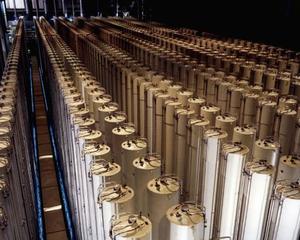Nuclear mattersU.S. makes nuclear fuel available to other countries
The United States announced the availability of a reserve stockpile of low-enriched uranium (LEU) for use in nuclear fuel; the LEU is derived from down-blended surplus military material; the LEU will be made available to countries interested in nuclear power generation, thus making it unnecessary for these countries to develop their own uranium-enrichment technology

By supplying uranium, U.S. hopes to contain enrichment programs // Source: thecuttingedgenews.com
The United States has formally announced the availability of a reserve stockpile of low-enriched uranium (LEU) for use in nuclear fuel. The LEU is derived from down-blended surplus military material.
Called the American Assured Fuel Supply (AFS), the reserve announced by the Department of Energy (DoE) and the National Nuclear Security Administration (NNSA) sets aside a reserve of LEU from the down-blending of surplus high-enriched uranium (HEU) from U.S. weapons. The NNSA said that the material is to be available as a backup fuel supply for foreign or domestic nuclear reactors in the event of a supply disruption. The agency says that this reserve creates a vehicle for promoting the peaceful use of nuclear energy without exacerbating nuclear proliferation risks – because countries looking to develop nuclear power programs can now be assured of a secure supply of nuclear fuel, thus obviating the need to develop their own uranium enrichment technology.
In 2005 the DoE announced its plan to set aside 17.4 tons of surplus HEU to be down-blended to LEU and held in reserve to deal with disruptions in nuclear fuel supply. The down-blending of the 17.4 tons of HEU set aside for the AFS should be completed in 2012, and 230 tons of the 290 tons of LEU produced will make up the reserve, with the remainder being used to pay for the down-blending and processing costs. This should leave enough for approximately six reloads for a typical 1,000 MWe reactor, NNSA says.
The NNSA notes that the reserve will be available for sale at market value in the event of demonstrated need after all other market options have been exhausted. The eligibility of would-be recipients will be assessed by a committee chaired by the NNSA’s Office of Nonproliferation and International Security, with the sale of any uranium requiring final approval from the energy secretary who will also have the authority to prioritize requests.
The AFS stands alongside other initiatives to create international fuel reserves managed under the auspices of the International Atomic Energy Agency (IAEA). The World Nuclear News notes that Russia already funds the storage of 120 tons of LEU at the International Uranium Enrichment Center at Angarsk, available to any IAEA member state in good standing which is unable to procure fuel for political reasons. The IAEA is also drawing up a framework to establish an International Fuel Bank with the support of $50 million from the U.S.-based Nuclear Threat Initiative organization and $107 million from the U.S. and other governments.
U.S. energy secretary Steven Chu described the assurance of fuel supply without promoting proliferation sensitive technologies to countries looking toward nuclear power as a critical national security priority. “In addition to protecting fuel supplies for commercial power producers, the Assured Fuel Supply helps demonstrate our commitment to nuclear nonproliferation by eliminating surplus weapons uranium in a way that promotes the peaceful use of nuclear energy,” he said.
U.S. reactor suppliers will also benefit from the move. “Establishing this reserve will put confidence in the United States as a reliable supplier of nuclear fuel and should encourage other governments to see American nuclear vendors as preferable partners,” the NNSA notes.
